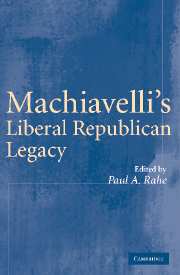Book contents
- Frontmatter
- Contents
- List of Contributors
- Acknowledgments
- Abbreviations and Brief Titles
- Introduction: Machiavelli's Liberal Republican Legacy
- Prologue: Machiavelli's Rapacious Republicanism
- PART I THE ENGLISH COMMONWEALTHMEN
- PART II THE MODERATE ENLIGHTENMENT
- 4 Getting Our Bearings: Machiavelli and Hume
- 5 The Machiavellian Spirit of Montesquieu's Liberal Republic
- 6 Benjamin Franklin's “Machiavellian” Civic Virtue
- PART III THE AMERICAN FOUNDING
- Index
4 - Getting Our Bearings: Machiavelli and Hume
Published online by Cambridge University Press: 24 July 2009
- Frontmatter
- Contents
- List of Contributors
- Acknowledgments
- Abbreviations and Brief Titles
- Introduction: Machiavelli's Liberal Republican Legacy
- Prologue: Machiavelli's Rapacious Republicanism
- PART I THE ENGLISH COMMONWEALTHMEN
- PART II THE MODERATE ENLIGHTENMENT
- 4 Getting Our Bearings: Machiavelli and Hume
- 5 The Machiavellian Spirit of Montesquieu's Liberal Republic
- 6 Benjamin Franklin's “Machiavellian” Civic Virtue
- PART III THE AMERICAN FOUNDING
- Index
Summary
More than fifty years ago, political commentator Max Lerner called Machiavelli “the first modern analyst of power,” and identified The Prince as “one of the half dozen books that have done most to shape Western thought.” Machiavelli deserves credit, according to this line of thought (and according to Machiavelli himself) for establishing the first scientific political science, based on steely–eyed scrutiny of actual human behavior and the passions that move human beings in all ages. “Whoever considers present and ancient things easily knows that in all cities and in all peoples there are the same desires and the same humors, and there always have been,” Machiavelli writes. “So it is an easy thing for whoever examines past things diligently to foresee future things in every republic” (D 1.39). It follows that history, or the register of “past things,” is the laboratory in which the political scientist works. There is a remarkably similar passage in David Hume's writings:
Mankind are so much the same, in all times and places, that history informs us of nothing new or strange in this particular. Its chief use is only to discover the constant and universal principles of human nature, by showing men in all varieties of circumstances and situations, and furnishing us with materials from which we may form our observations and become acquainted with the regular springs of human actions and behavior.
(EHU 83)- Type
- Chapter
- Information
- Machiavelli's Liberal Republican Legacy , pp. 94 - 120Publisher: Cambridge University PressPrint publication year: 2005
- 1
- Cited by



